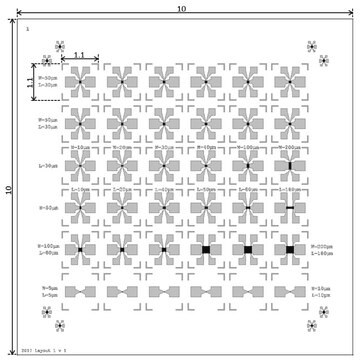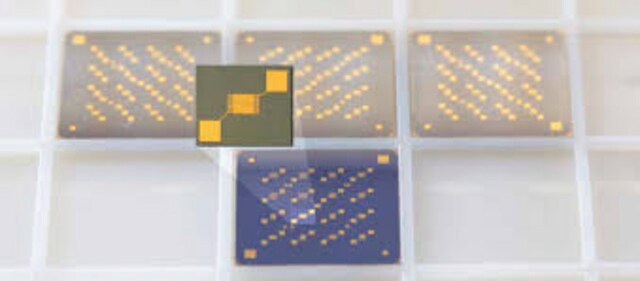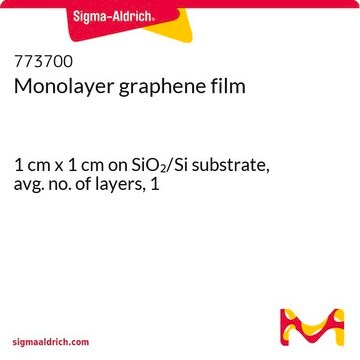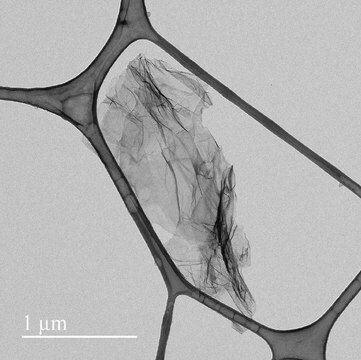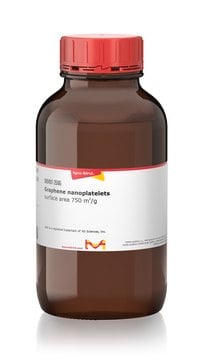GRFETS20
Graphene FET chip
S20
Synonyme(s) :
2-probe FET device, 2-probe Graphene FET sensor, Chemical gated Graphene FET, GFET S20, Graphene field effect transistor chip S20
About This Item
Produits recommandés
Description
Absolute Maximum Ratings
Maximum gate-source voltage: ± 50 V
Maximum temperature rating: 150 °C
Maximum drain-source current density: 107 A/cm2
Chip dimensions: 10 mm x 10 mm
Chip thickness: 675 μm
Dirac point: < 50 V
Yield >75%
Encapsulation: 50 nm Al2O3 + 100 nm Si3N4
Gate oxide materials: 90 nm SiO2
Graphene field-effect mobility: >1000 cm2/V·s
Monolayer CVD grown Graphene based 2-probe field effect transistors (FET).
Number of devices per chip: 12
Resistivity of substrate: 1-10 Ω·cm
Metallization: Chromium/Gold-Palladium 2/50 nm
Vous recherchez des produits similaires ? Visite Guide de comparaison des produits
Catégories apparentées
Description générale
The graphene FET-S20 chip is designed for measurements in liquid medium. This chip provides 12 graphene devices, with encapsulation on the metal pads to avoid degradation and reduce leakage currents, and the probe pads located near the periphery of the chip. It also includes a non-encapsulated electrode at the center of the chip, which allows liquid gating without the need of an external gate electrode.
Application
- Bioelectronics
- FET based sensor research for active materials deposited on graphene
- Clinical applications
- Biosensors
Caractéristiques et avantages
- State-of-the-art GFETs utilizing consistently high-quality CVD monolayer graphene
- Metallic contacts and metal/graphene interface are encapsulated to avoid degradation and reduce leakage current in liquid environment
- Perfect platform device for new sensor research and development
- 12 individual GFETs per chip
- A central gate electrode
Code de la classe de stockage
11 - Combustible Solids
Classe de danger pour l'eau (WGK)
nwg
Point d'éclair (°F)
Not applicable
Point d'éclair (°C)
Not applicable
Listes réglementaires
Les listes réglementaires sont principalement fournies pour les produits chimiques. Seules des informations limitées peuvent être fournies ici pour les produits non chimiques. L'absence d'indication signifie qu'aucun des composants n'est répertorié. Il incombe à l'utilisateur de s'assurer de l'utilisation sûre et légale du produit.
EU REACH Annex XVII (Restriction List)
Faites votre choix parmi les versions les plus récentes :
Certificats d'analyse (COA)
It looks like we've run into a problem, but you can still download Certificates of Analysis from our Documents section.
Si vous avez besoin d'assistance, veuillez contacter Service Clients
Déjà en possession de ce produit ?
Retrouvez la documentation relative aux produits que vous avez récemment achetés dans la Bibliothèque de documents.
Articles
Graphene nanoribbons (GNRs) are quasi-one-dimensional narrow strips of graphene comprised of sp2-hybridized carbon atoms arranged into hexagonal honeycomb lattice configurations.
Notre équipe de scientifiques dispose d'une expérience dans tous les secteurs de la recherche, notamment en sciences de la vie, science des matériaux, synthèse chimique, chromatographie, analyse et dans de nombreux autres domaines..
Contacter notre Service technique